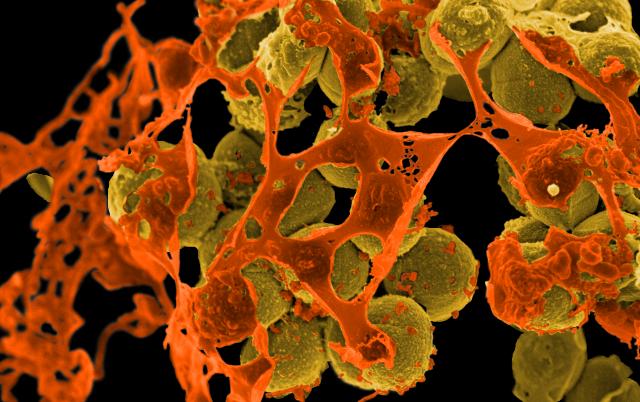 Noam ArztA recent article in HealthAffairs describes a significant decline in the number of both operational HIEs and HIEs in the planning stage from several years earlier. The authors note continuing barriers to broad-based HIE and a shift to vendor-driven exchange which diminishes the effectiveness of community-based networks. In effect, this translates to a shift away from geographic-based/dominated HIEs to product-dominated HIEs. We have already noted (see The Interoperability of Things) the lack of a national strategy on HIE, and ONC’s Nationwide Interoperability Roadmap barely mentions the concept.
Noam ArztA recent article in HealthAffairs describes a significant decline in the number of both operational HIEs and HIEs in the planning stage from several years earlier. The authors note continuing barriers to broad-based HIE and a shift to vendor-driven exchange which diminishes the effectiveness of community-based networks. In effect, this translates to a shift away from geographic-based/dominated HIEs to product-dominated HIEs. We have already noted (see The Interoperability of Things) the lack of a national strategy on HIE, and ONC’s Nationwide Interoperability Roadmap barely mentions the concept.
public health
See the following -
The Pentagon Contract That Could Shape EHRs For Years To Come — Epic Pays Out To Win Friends And Influence Congress
Arthur Allen | Politico.com | October 17, 2014
GENTLEMEN (AND WOMEN) START YOUR (INTEROPERABLE) ENGINES: The Department of Defense’s $11 billion, 10-year contract for a new electronic health records system won’t just shape military health for the next decade, reports Ashley Gold, it could very well predict the future of electronic health records and their handling of interoperability. Read More »
- Login to post comments
The Ransomware Attacks on Hospitals Are (Cyber) Criminal
By Kim Bellard | November 2, 2020
 One of the redeeming aspects of crises is that, amidst all the confusion, suffering, and loss, there are usually moments of grace, of humans showing their best nature... Unfortunately, crises also tend to bring out the worst of our natures... And then there are the cyberattacks. Last week the federal Cybersecurity & Infrastructure Security Agency, the FBI, and HHS issued a joint alert Ransomware Activity Targeting the Healthcare and Public Health Sector, warning that they have "credible information of an increased and imminent cybercrime threat to U.S. hospitals and healthcare providers." I'll spare you the technical details of the expected attack strategies or suggested mitigation efforts, but I will note that they warned: "CISA, FBI, and HHS do not recommend paying ransom." Read More »
One of the redeeming aspects of crises is that, amidst all the confusion, suffering, and loss, there are usually moments of grace, of humans showing their best nature... Unfortunately, crises also tend to bring out the worst of our natures... And then there are the cyberattacks. Last week the federal Cybersecurity & Infrastructure Security Agency, the FBI, and HHS issued a joint alert Ransomware Activity Targeting the Healthcare and Public Health Sector, warning that they have "credible information of an increased and imminent cybercrime threat to U.S. hospitals and healthcare providers." I'll spare you the technical details of the expected attack strategies or suggested mitigation efforts, but I will note that they warned: "CISA, FBI, and HHS do not recommend paying ransom." Read More »
- Login to post comments
The Reduction of State-coordinated HIE: How Should Public Health React?
By Noam H. Arzt, Ph.D. | August 2, 2016
- Login to post comments
The Rising Clout of the Patient
Sarah Krüg | PharmExecBlog | January 9, 2012
In 2011, the patient’s clout as a stakeholder was firmly established, as reflected in several industry conferences. What’s next for the patient in 2012? Read More »
- Login to post comments
The Roles I Play
John Halamka | Healthcare IT News | January 15, 2014
As 2014 begins, I marvel at the evolution of the CIO role from 1997 to 2014. Gone are the days when my role was to serve as technical expert, configuring web servers, optimizing data bases, or simplifying code. [...] Here are a few examples of the roles I play today from the past few weeks: Read More »
- Login to post comments
The Sequoia Project’s Emergency Preparedness Information Workgroup Publishes Health IT Pandemic Response Planning Recommendations - The Sequoia Project
Press Release |
The Sequoia Project |
February 28, 2022
 The Sequoia Project’s Emergency Preparedness Information Workgroup (EPIW) today published Pandemic Response Insights and Recommendations, a free whitepaper for local, state, and federal emergency preparedness and public health officials and their partners. The workgroup, consisting of emergency preparedness, response, and public health experts, convened over several months to discuss gaps in current solutions. The workgroup recommended ways to make information more readily available to support a more robust and coordinated response to future emergencies.
The Sequoia Project’s Emergency Preparedness Information Workgroup (EPIW) today published Pandemic Response Insights and Recommendations, a free whitepaper for local, state, and federal emergency preparedness and public health officials and their partners. The workgroup, consisting of emergency preparedness, response, and public health experts, convened over several months to discuss gaps in current solutions. The workgroup recommended ways to make information more readily available to support a more robust and coordinated response to future emergencies.
- Login to post comments
The Shame of US Health Care Dysfunction: Hookworm Returns to Alabama
Roy M. Poses, MD | Health Care Renewal | September 7, 2017
 An article just published online(1), and reported so far in only one major media outlet (the Guardian, based in the UK) showed how hookworm, now considered a disease of poor, third world countries, has returned to the American south. This in a country which spends more per capita on health care than any other supposedly developed country. A 2009 article in Health Affairs documented the supposed elimination of common diseases once found in US.(2) The background of the article included...
An article just published online(1), and reported so far in only one major media outlet (the Guardian, based in the UK) showed how hookworm, now considered a disease of poor, third world countries, has returned to the American south. This in a country which spends more per capita on health care than any other supposedly developed country. A 2009 article in Health Affairs documented the supposed elimination of common diseases once found in US.(2) The background of the article included...
- Login to post comments
The Shutdown Will Harm the Health and Safety of Americans, even After it's Long Over
By Morten Wendelbo | January 15, 2019
 With the U.S. federal government shutdown now the longest in history, it's important to understand what a shutdown means for the health and safety of Americans. The good news is that in the short run, the consequences are relatively few. But, as a researcher who studies natural disaster planning, I believe that Americans should be worried about the federal government's long-term ability to ensure good public health and protect the public from disasters. As the shutdown drags on, it increasingly weakens the government's ability to protect Americans down the road, long after federal workers are allowed to go back to work. Many of these effects are largely invisible and may feel intangible because they don't currently affect specific individuals...
With the U.S. federal government shutdown now the longest in history, it's important to understand what a shutdown means for the health and safety of Americans. The good news is that in the short run, the consequences are relatively few. But, as a researcher who studies natural disaster planning, I believe that Americans should be worried about the federal government's long-term ability to ensure good public health and protect the public from disasters. As the shutdown drags on, it increasingly weakens the government's ability to protect Americans down the road, long after federal workers are allowed to go back to work. Many of these effects are largely invisible and may feel intangible because they don't currently affect specific individuals...
- Login to post comments
The Threat From Antibiotic Use On The Farm
Donald Kennedy | The Washington Post | August 22, 2013
When I was commissioner of the U.S. Food and Drug Administration (FDA), the agency’s national advisory committee recommended in 1977 that we eliminate an agricultural practice that threatened human health. Routinely feeding low doses of antibiotics to healthy livestock, our scientific advisory committee warned, was breeding drug-resistant bacteria that could infect people. Read More »
- Login to post comments
The Time to Stop Giving Antibiotics to Cows, Pigs, and Chickens Is Now
Ed Silverman | STAT | December 29, 2015
 Antibiotic resistance has been blamed for at least 2 million illnesses and 23,000 deaths in the US. Researchers are especially concerned about the widespread use of antibiotics in raising cattle, pigs, and other animals for food production. The drugs help the animals bulk up, which boosts their value, but experts warn that they can also promote antibiotic resistance. I’ve asked two guest authors, Josh Bloom and Dr. David Shlaes of the American Council on Science and Health, to share their insights on this issue. They warn that more needs to be done to curb the use of antibiotics in food-producing animals.
Antibiotic resistance has been blamed for at least 2 million illnesses and 23,000 deaths in the US. Researchers are especially concerned about the widespread use of antibiotics in raising cattle, pigs, and other animals for food production. The drugs help the animals bulk up, which boosts their value, but experts warn that they can also promote antibiotic resistance. I’ve asked two guest authors, Josh Bloom and Dr. David Shlaes of the American Council on Science and Health, to share their insights on this issue. They warn that more needs to be done to curb the use of antibiotics in food-producing animals.
- Login to post comments
The Toxins That Threaten Our Brains
James Hamblin | The Atlantic | March 18, 2014
Leading scientists recently identified a dozen chemicals as being responsible for widespread behavioral and cognitive problems. But the scope of the chemical dangers in our environment is likely even greater. Why children and the poor are most susceptible to neurotoxic exposure that may be costing the U.S. billions of dollars and immeasurable peace of mind.
- Login to post comments
The Underreported Side Of The Ebola Crisis
Rose Ann DeMoro | The Blog | September 6, 2014
Amid the media accounts of the worst Ebola outbreak ever recorded some significant context is largely missing from the major media reporting. Atop this list are links of the outbreak to the climate crisis and global inequality, mal-distribution of wealth, and austerity-driven cuts in public services that have greatly contributed to the rapid spread of Ebola...
- Login to post comments
The Value of EHR Interoperability that Money Can't Buy
By Marc Wine, and Peter Groen | January 7, 2013
 There seems to be something missing in our national debate about health care and the use of health information technologies (IT) in this marketplace. Do we want a more 'open' healthy society, or a more closed system? What role should markets play in public health and medical sociology? How do we decide which EHR solutions to acquire? Should we be looking more closely at open source alternatives versus proprietary programs. Should money, quality of care, or some other non-market values determine what's best for the patient? This cuts to the heart of the debate. Consider the hospital that chooses to not pay an expensive proprietary EHR vendor for the enhanced code required by a doctor in order to get the latest real time knowledge for treating a patient's disease.
There seems to be something missing in our national debate about health care and the use of health information technologies (IT) in this marketplace. Do we want a more 'open' healthy society, or a more closed system? What role should markets play in public health and medical sociology? How do we decide which EHR solutions to acquire? Should we be looking more closely at open source alternatives versus proprietary programs. Should money, quality of care, or some other non-market values determine what's best for the patient? This cuts to the heart of the debate. Consider the hospital that chooses to not pay an expensive proprietary EHR vendor for the enhanced code required by a doctor in order to get the latest real time knowledge for treating a patient's disease.
- Login to post comments
Time To Measure Public Health Effectiveness
Staff Writer | Government Health IT | August 25, 2014
It has historically been difficult for public health officials — especially at cash-strapped state and local departments — to actually gauge whether or not their outreach and initiatives really work. A new tool from the Robert Wood Johnson Foundation and Health Partners aims to change that...
- Login to post comments
TPP Treaty Could be a Serious Threat to US Public Health System
By Roy M. Poses, MD | May 26, 2015
 While trade agreements may seem to be another, albeit international species of wonkery, these agreements could have major effects on patients' and the public's health. Since these concerns have been essentially ignored by the US medical and health care literature, (although they have appeared in UK journals, Australian, and New Zealand journals in English), they I will discuss them below. Worthy of further discussion is the possibility that these potential threats to health care and public health may arise not just from ideological disagreements, but also from health care corporations' increasing capture of government, facilitated by the conflicts of interest generated by the revolving door. Read More »
While trade agreements may seem to be another, albeit international species of wonkery, these agreements could have major effects on patients' and the public's health. Since these concerns have been essentially ignored by the US medical and health care literature, (although they have appeared in UK journals, Australian, and New Zealand journals in English), they I will discuss them below. Worthy of further discussion is the possibility that these potential threats to health care and public health may arise not just from ideological disagreements, but also from health care corporations' increasing capture of government, facilitated by the conflicts of interest generated by the revolving door. Read More »
- Login to post comments